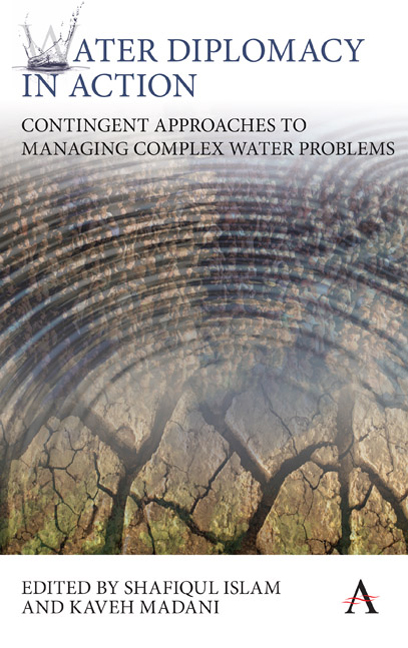Book contents
- Frontmatter
- Contents
- List of Figures
- List of Tables
- The Blind Men, the Elephant and the Well: A Parable for Complexity and Contingency
- Preface
- Part I ROOTS AND CAUSES OF COMPLEXITY AND CONTINGENCY IN WATER PROBLEMS
- Part II TOOLS, TECHNIQUES, MODELS AND ANALYSES TO RESOLVE COMPLEX WATER PROBLEMS
- Part III CASE STUDIES
- Chapter Ten The Nature of Enabling Conditions of Transboundary Water Management: Learning from the Negotiation of the Indus and Jordan Basin Treaties
- Chapter Eleven Mediation in the Israeli– Palestinian Water Conflict: A Practitioner's View
- Chapter Twelve Risk Distribution and the Adoption of Flexibility: Desalination Expansion in Qatar
- Chapter Thirteen The Grand Ethiopian Renaissance Dam: Conflict and Water Diplomacy in the Nile Basin
- Chapter Fourteen Engaging Stakeholders for Water Diplomacy: Lessons for Integrated Water Resources Management
- Chapter Fifteen Strategic Insights for California's Delta Conflict
- Notes on Contributors
- Index
Chapter Fourteen - Engaging Stakeholders for Water Diplomacy: Lessons for Integrated Water Resources Management
from Part III - CASE STUDIES
Published online by Cambridge University Press: 10 January 2018
- Frontmatter
- Contents
- List of Figures
- List of Tables
- The Blind Men, the Elephant and the Well: A Parable for Complexity and Contingency
- Preface
- Part I ROOTS AND CAUSES OF COMPLEXITY AND CONTINGENCY IN WATER PROBLEMS
- Part II TOOLS, TECHNIQUES, MODELS AND ANALYSES TO RESOLVE COMPLEX WATER PROBLEMS
- Part III CASE STUDIES
- Chapter Ten The Nature of Enabling Conditions of Transboundary Water Management: Learning from the Negotiation of the Indus and Jordan Basin Treaties
- Chapter Eleven Mediation in the Israeli– Palestinian Water Conflict: A Practitioner's View
- Chapter Twelve Risk Distribution and the Adoption of Flexibility: Desalination Expansion in Qatar
- Chapter Thirteen The Grand Ethiopian Renaissance Dam: Conflict and Water Diplomacy in the Nile Basin
- Chapter Fourteen Engaging Stakeholders for Water Diplomacy: Lessons for Integrated Water Resources Management
- Chapter Fifteen Strategic Insights for California's Delta Conflict
- Notes on Contributors
- Index
Summary
Abstract
Stakeholder engagement and participatory approaches for water diplomacy are increasingly used for developing trust, consensus and communication while stimulating the water reform process. This is particularly important to addressing future water challenges and improving water security.
The effectiveness of stakeholder engagement in water resources management depends on a number of factors, including the method employed, inclusiveness of the engagement process, local knowledge and time made available for the stakeholder dialogue to develop.
There is a plethora of literature available on stakeholder engagement, both within and outside of water resources management discipline, and there are some important lessons that may be applicable in developing water diplomacy in a range of situations. In this chapter, we identify key features of stakeholder engagement and water diplomacy from an array of disciplines as to their suitability for integrated water resources management.
The concepts and experiences examined suggest that involvement of stakeholders, especially in the early stages of an engagement and diplomacy process, has the advantage of pursuing participatory decision making and facilitating social learning. The stakeholder engagement process increases the likelihood of meeting the needs and priorities of local communities and improves the overall process of water diplomacy.
Overall, successful engagement processes for water diplomacy help in acceptability of difficult and complex decisions made through mutual trust with strong elements of transparency, accountability and legitimacy. Furthermore, the engagement process helps in an improved stakeholder relationship, adaptability and resilience decisions, dissemination of decisions to the wider community and the capacity building of the stakeholders.
Introduction
Traditional engineering and economic solutions are insufficient to resolve most complex water issues. Management of water as a resource is becoming increasingly critical in urban, peri-urban and rural areas. Watershed boundaries transcending political boundaries increase the complexity of issues. The major drive for this critical situation stems from two aspects; the experienced and predicted scarcity of water spatially and temporally all over the world (Faust et al. 2013) and the increasing demand for available water, both in quantity and quality, among multiple stakeholders (Pinto and Maheshwari 2010). Additionally, the anthropogenic activities degrading water quality have ironically impacted the very existence of humans (Erdogan 2013; Grover and Krantzberg 2015, 185– 86).
- Type
- Chapter
- Information
- Water Diplomacy in ActionContingent Approaches to Managing Complex Water Problems, pp. 265 - 288Publisher: Anthem PressPrint publication year: 2017



